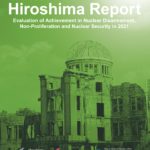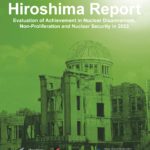Hiroshima Report 2023(4) Cooperation with the IAEA
One of the most important measures to strengthen the effectiveness of the IAEA safeguards system is to promote the universal application of the Additional Protocol. Among the countries surveyed in this project, Australia, Austria, Canada, France, Germany, Indonesia, Japan, South Korea, Mexico, the Netherlands, New Zealand, Norway, Poland, Sweden, Switzerland, Turkey, the UAE, the United Kingdom and the United States consider the Additional Protocol “an integral part” of the current IAEA safeguards system.
On the other hand, the NAM takes the position that, “additional measures related to the safeguards shall not undermine, condition, or in any way negatively affect the rights of the [NNWS] parties to the Treaty, which are already committed to non-proliferation of nuclear weapons and have renounced the nuclear-weapon option.” The NAM also “emphasize[d] that it is fundamental to make a clear distinction between legal obligations and voluntary confidence-building measures and that such voluntary undertakings shall not be turned into legal safeguards obligations.”117 Brazil also opposes making the Additional Protocol, which is a voluntary measure, a standard for the IAEA safeguards system.118 Meanwhile, South Africa, which concluded its Additional Protocol in 2002, supports the universalization of the Additional Protocol whilst it is a voluntary instrument.
The draft final document of the NPT RevCon stated, “The Conference notes that it is the sovereign decision of any State to conclude an additional protocol, but once in force the additional protocol is a legal obligation. … The Conference encourages all States parties that have not yet done so to conclude and bring into force an additional protocol and to support the IAEA’s efforts to encourage broader adherence to the additional protocol.”
In a resolution titled “Strengthening the Effectiveness and Improving the Efficiency of Agency Safeguards,” adopted at the 2021 IAEA General Conference, the following points were stated regarding the Additional Protocols:119
➢ “[I]t is the sovereign decision of any State to conclude an additional protocol, but once in force, the additional protocol is a legal obligation, encourages all States which have not yet done so to conclude and to bring into force additional protocols as soon as possible and to implement them provisionally pending their entry into force in conformity with their national legislation.”
➢ “[I]n the case of a State with a comprehensive safeguards agreement supplemented by an additional protocol in force, these measures represent the enhanced verification standard for that State.”
The IAEA has developed and approved the “state-level approach (SLA)” based on a state-level concept (SLC) under which the Agency considers a broad range of information about a country’s nuclear capabilities and tailors its safeguards activities in each country accordingly, so as to make IAEA safeguards more effective and efficient.
According to the IAEA, as of June 2022, SLAs were developed and approved for implementation for 70 States with a CSA and an Additional Protocol in force, and a broader conclusion; 37 States with a CSA and an Additional Protocol in force but without a broader conclusion; 26 States with a CSA but no Additional Protocol in force; and one State with a Voluntary Offer Agreement and an AP in force.120 The report also states that the SLA was developed for two countries (France and the United Kingdom) that have VOAs and Additional Protocols in force. VOAs and Additional Protocols in force.121
Regarding research and development of safeguards technologies, as part of its long-term plan,122 the IAEA conducted the “Development and Implementation Support Programme for Nuclear Verification 2022-2023,”123 in which 22 countries (including Australia, Brazil, Canada, China, France, Germany, Japan, South Korea, the Netherlands, Russia, South Africa, Sweden, Switzerland, the United Kingdom and the United States) and the European Commission (EC) participated.
The countries surveyed that had outstanding obligations to the IAEA regular budget in 2021 (as of September 2022) were Brazil and Iran.124
117 Ibid.
118 “Statement by Brazil,” Cluster 2, 2019 NPT PrepCom, May 3, 2019. Argentina and Brazil conduct mutual inspections under the bilateral Brazilian-Argentine Agency for Accounting and Control of Nuclear Materials (ABACC). Brazil argues that it is a substitute for the Additional Protocol.
119 GC(66)/RES/10, September 2022.
120 GC(66)/136, August 3, 2022.
121 Ibid.
122 IAEA, “IAEA Department of Safeguards Long-Term R&D Plan, 2012-2023,” January 2013.
123 IAEA, “Development and Implementation Support Programme for Nuclear Verification 2022-2023,” January 2022.
124 GC(66)/INF/9, September 23, 2022.






